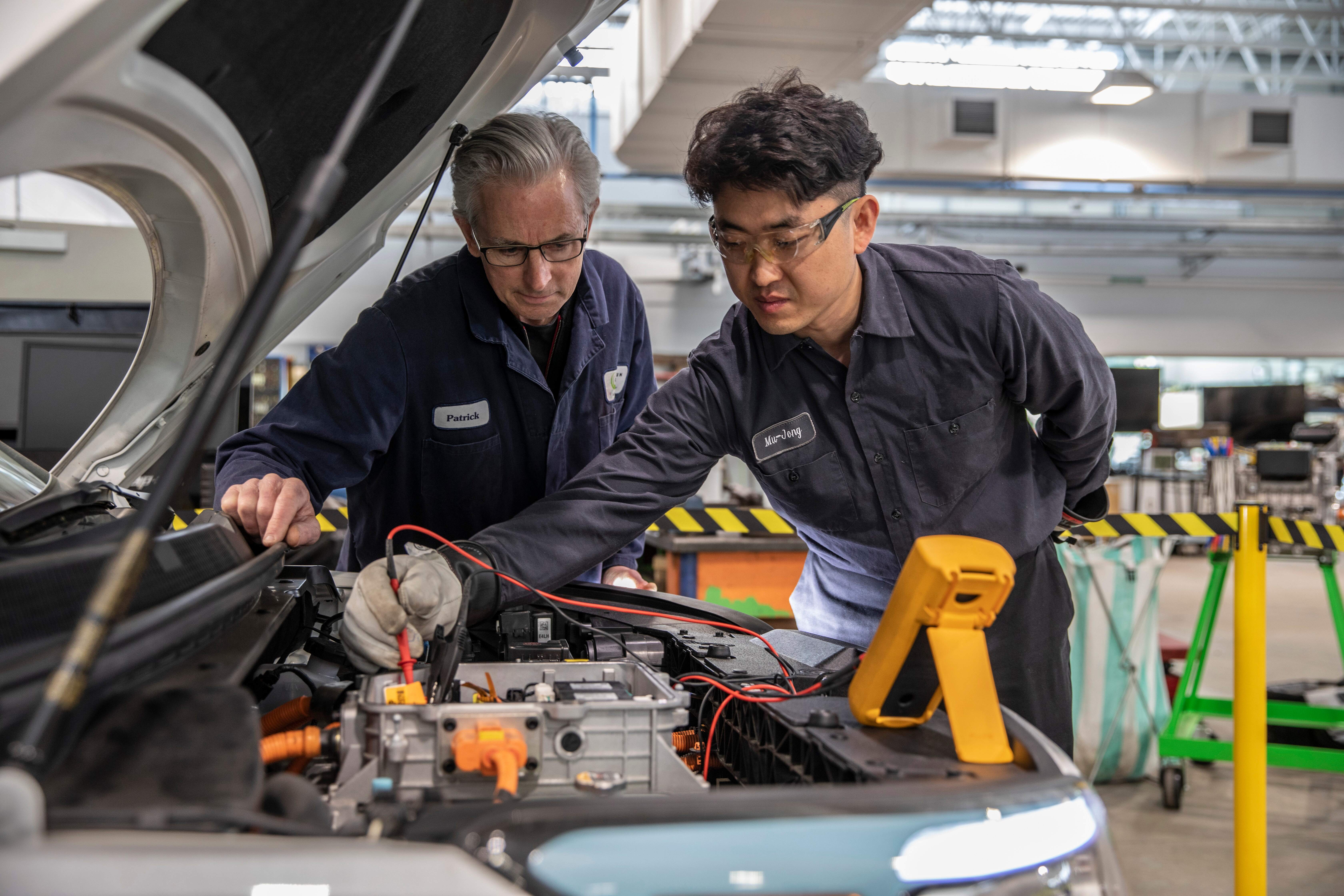CEET 100V - Electric Vehicle Technology and Service Micro-Credential
Course Description

Receive up to $3,500 in tuition support towards this course!
Seats in this course may be partially or fully covered by the StrongerBC future skills grant for eligible learners. Check your eligibility and apply here.
This Micro-Credential provides Automotive Service Technicians with an entry point into the knowledge and skills required to diagnose, service, and repair high-voltage electric vehicles safely. Designed for Professional Automotive Technicians to build on experience with conventional vehicle systems and develop the specialized skills necessary to service and maintain the ever-increasing numbers of electric vehicles on our roads.
This Micro-Credential meets the current high demand for EV training in the dealership, independent, and fleet repair community consisting of 6 hours of interactive online learning and 30 hours of in class/shop theory and hands-on practical instruction.
As there is wide demand for this type of education, we anticipate offering a modified version of this course to individuals who may not be automotive technicians. If you are not an automotive technician and are interested in electric vehicle training, please fill out this quick form.
Course Outline
The Micro-Credential is set up in eight modules, the first three modules are to be completed online (approx. 6 hrs. to complete) prior to the start of the start of the in-person class. Their will be review and additions of this content during the lab section.
-
There are numerous hands-on practical tasks completed during the course, including high-voltage (HV) battery pack removal, disassembly, testing and re-assembly; HV isolation fault testing and diagnosis; 3-phase HV motor diagnosis and testing; charging system testing and analysis
-
There are a total of three quizzes, done during the online portion, and a final 40 question test done on the last day in the classroom.
Learner Outcomes
This 36-hour Camosun College Micro-Credential course is designed to give students a broad understanding of EV Technology and Service including:
-
Applying high voltage safety procedures
-
Distinguishing different categories of high voltage vehicles
-
Describing high voltage powertrain systems
-
Servicing high voltage powertrain systems
-
Servicing high voltage battery charging systems
-
Comparing high voltage vehicle drivetrain systems
-
Servicing high voltage vehicle temperature management systems
-
Describing maintenance procedures and summarizing known concerns for high voltage vehicles
Notes
Students are required to supply their own CSA approved footwear, coveralls/workwear, and safety glasses. High voltage safety PPE will be available for student use.
Prerequisites
Automotive Service Technician Red Seal Endorsement or registered apprentices who have completed Level 3 technical training. If you are an individual with a sound understanding of electrical theory, along with an engineering background or automotive repair experience or EV conversion experience, you may also be admitted. Prior to registering for this class, please confirm your eligibility with the instructor by emailing jonesp@camosun.ca.
Testimonials
“Camosun College is a very well-equipped facility with everything from cut away parts and whole engines with their components to complete vehicles to diagnose and take apart and test their systems hands on.
Myself and our Techs from Saanich all came away with a great training experience and new knowledge for ourselves and to take back to our workplaces. I would recommend this program to anyone or any operation that has EVs now or will have in the future.”
Mike Warhurst
Fleet Supervisor
District of Saanich
About the Instructor
Patrick Jones is an automotive enthusiast, an award-winning Instructor, and Program Leader in the Camosun College Automotive Department. He is a Red-Seal Certified Automotive Technician with more than 25 years of practical experience and teaches all levels of the Skilled Trades BC Automotive Service Technician Program. He has a BC Provincial Instructor Diploma and a Master of Education Degree in post-secondary curriculum and instruction from SFU. He has many years of specialized automotive technical training and has completed numerous Electric and Advanced Vehicle training programs through FutureTech Auto. Most recently, Patrick completed the SAE-ITC Electrified Transportation Pro+ Level 3 Trainer Certification Program in Michigan, becoming the only person in BC with this internationally recognized certification. He continues to focus his professional development on electrified transportation and advanced vehicle technologies. Patrick is seriously passionate about automobiles and education and is dedicated to sharing his enthusiasm while supporting students in their learning and inspiring their success.

Supported by the Province of British Columbia


